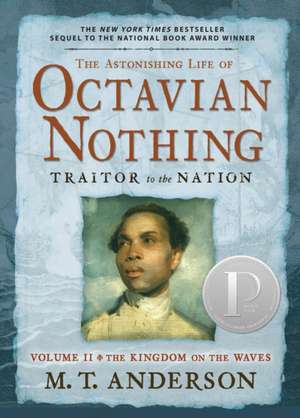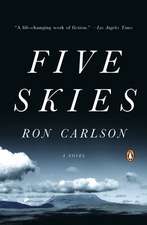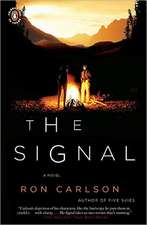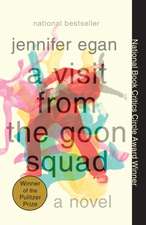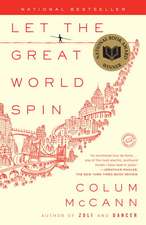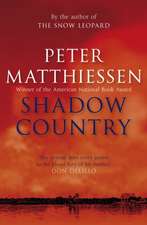The Astonishing Life of Octavian Nothing, Traitor to the Nation Volume II: The Kingdom on the Waves: Astonishing Life of Octavian Nothing, Traitor to the Nation, cartea 2
Autor M. T. Andersonen Limba Engleză Paperback – 30 sep 2009 – vârsta de la 14 ani
"A novel of the first rank, the kind of monumental work Italo Calvino called ‘encyclopedic’ in the way it sweeps up history into a comprehensible and deeply textured pattern." — THE NEW YORK TIMES BOOK REVIEW
Fearing a death sentence, Octavian and his tutor, Dr. Trefusis, escape through rising tides and pouring rain to find shelter in British-occupied Boston. Sundered from all he knows — the College of Lucidity, the rebel cause — Octavian hopes to find safe harbor. Instead, he is soon to learn of Lord Dunmore's proclamation offering freedom to slaves who join the counterrevolutionary forces.
In Volume II of his unparalleled masterwork, M. T. Anderson recounts Octavian's experiences as the Revolutionary War explodes around him, thrusting him into intense battles and tantalizing him with elusive visions of liberty. Ultimately, this astonishing narrative escalates to a startling, deeply satisfying climax, while reexamining our national origins in a singularly provocative light.
Preț: 86.34 lei
Nou
Puncte Express: 130
Preț estimativ în valută:
16.53€ • 17.01$ • 13.93£
16.53€ • 17.01$ • 13.93£
Carte disponibilă
Livrare economică 07-21 februarie
Preluare comenzi: 021 569.72.76
Specificații
ISBN-13: 9780763646264
ISBN-10: 0763646261
Pagini: 561
Ilustrații: 1-COLOR
Dimensiuni: 147 x 203 x 40 mm
Greutate: 0.54 kg
Editura: Candlewick Press (MA)
Seria Astonishing Life of Octavian Nothing, Traitor to the Nation
ISBN-10: 0763646261
Pagini: 561
Ilustrații: 1-COLOR
Dimensiuni: 147 x 203 x 40 mm
Greutate: 0.54 kg
Editura: Candlewick Press (MA)
Seria Astonishing Life of Octavian Nothing, Traitor to the Nation
Notă biografică
M. T. Anderson is the author of several novels for young adults, including the much-lauded THE ASTONISHING LIFE OF OCTAVIAN NOTHING, TRAITOR TO THE NATION, VOLUME I: THE POX PARTY, winner of the National Book Award, and FEED, which won the LOS ANGELES TIMES Book Prize and was a finalist for the National Book Award. M. T. Anderson lives in Cambridge, Massachusetts.
Extras
The rain poured from the heavens as we fled across the mud-flats, that scene of desolation; it soaked through our clothes and bit at the skin with its chill. It fell hard and ceaseless from the heavens as the deluge that had both inundated Deucalion and buoyed up Noah; and as with that deluge, we knew not whether it fell as an admonition for our sins or as the promise of a brighter, newly washed morning to come.
I left all that I knew behind me. Though the ways of the College of Lucidity were strange to the world and the habits of its academicians eccentric, they were familiar to me; and I traded them now for uncertainty and strife. Though I returned, indeed, to Boston, that town best known to me, its circumstances were changed, now that it was the seat of the King’s Army and sat silent and brooding in the Bay. We knew not what we would find therein.
Dr. Trefusis and I stumbled across the ribbed sand. Treading through seaweed mounded in pools, we slithered and groped, that we might retain our footing; and on occasions, we fell, Dr. Trefusis’s hands bleeding from the roughness of rock and incision of barnacles.
We wound through the meanders that led between stubbled mud-banks in no straight or seemly course. I pulled Dr. Trefusis out of the ditches where water still ran over the silt. We crawled over knolls usually submerged by the Bay. At some point, soaked, he shed his coat.
After a time, there was no feature but the sand, corrugated with the action of the tides. We made our way across a dismal plain, groping for detail, sight obscured.
But that morning I had been a prisoner, a metal mask upon my face, and my jowls larded with my own vomit, in a condition which could hardly have been more debased; but that morning I had watched the masters of my infancy and youth writhe upon the floor and fall into unpitied slumber, perhaps their bane. A sentence of death might already rest upon my head. The thought of this appeared fleetingly — the memory of those bodies on the floor, bound with silken kerchiefs — and at this, I found I could not breathe, and wished to run faster, that I might recover my breath.
Tumbling through the darkness of those flats, revolving such thoughts amidst utter indistinctness, I feared I would never again find myself; all I knew was lost and sundered from me; I knew not anymore what actuated me. We ran on through the night, across the sand, and it was as Dr. Trefusis had always avowed in his sparkish philosophy, that there was no form nor matter, that we acted our lives in an emptiness decorated with an empty show of substance, and a darkness infinite behind it.
Forms and figures loomed out of the rain: boulders in our path, gruesome as ogres to my susceptible wits, hulking, pocked and eyed with limpets, shaggy with weeds.
We came upon a capsized dinghy in the mud, mostly rotted, and barrels half-sunk. My aged companion now leaned upon my shoulder as we walked, his breath heavy in his chest.
Once, I started with terror at a ratcheting upon my foot, to find a horseshoe crab trundling past in search of a pool, its saber-tail and lobed armor grotesque in the extreme. Dr. Trefusis, wheezing, greeted it, "Old friend."
His amiability to the crab, I feared, was merely a pretense to stop our running. He did not seem well.
We could no longer detect the city, the night was so black, so full of water and motion, so unsparing was the drench. Our senses disorganized, our frames trembling with cold, we calculated as best we could the direction of our town and made our way across that countryside of dream.
Once I was shown by the scholars of the College a rock, spherical in shape, which, when chiseled open, revealed a tiny cavern of crystal; and they told me that these blunt stones often held such glories; that though some were filled only with dust, others, when broke open, enwombed the skeletons of dragons or of fish, beaked like birds. Thus I felt in approaching my city; that place which seemed known stone, but which, when riven after its long gestation, might contain either wonders, or ash, or the death in infancy of some clawed terror.
We found ourselves at the brink of the returning tide. We walked through it without notice, so thick was the very air with water, until the flood reached Dr. Trefusis’s knees, and there he halted, swaying. "I cannot continue," said he. "I will return to shore."
Thus his offer; but well did I know that he had no intention of returning to the bank, and could not unassisted, did he wish to. I was aware that if I left him, he would sink to the ground and allow the waters to cover him.
I instructed him to climb upon my shoulders.
"I will drag you down, Octavian."
"You have risked your all for me, sir; and it is only right that I do the same for you."
He considered this, and at length, we now feeling the motion of the tide through our legs, said, "When I become burdensome, cast me off backwards."
I leaned down as best I could with the waters rising, and he clambered atop me, clawing at my head and neck for purchase. When he was situated, I stood again and began striding through the returning sea.
_______
THE ASTONISHING LIFE OF OCTAVIAN NOTHING, TRAITOR TO THE NATION, VOLUME TWO: THE KINGDOM ON THE WAVES by M.T. Anderson. Copyright © 2008 by M. T. Anderson. Published by Candlewick Press, Inc., Somerville, MA.
I left all that I knew behind me. Though the ways of the College of Lucidity were strange to the world and the habits of its academicians eccentric, they were familiar to me; and I traded them now for uncertainty and strife. Though I returned, indeed, to Boston, that town best known to me, its circumstances were changed, now that it was the seat of the King’s Army and sat silent and brooding in the Bay. We knew not what we would find therein.
Dr. Trefusis and I stumbled across the ribbed sand. Treading through seaweed mounded in pools, we slithered and groped, that we might retain our footing; and on occasions, we fell, Dr. Trefusis’s hands bleeding from the roughness of rock and incision of barnacles.
We wound through the meanders that led between stubbled mud-banks in no straight or seemly course. I pulled Dr. Trefusis out of the ditches where water still ran over the silt. We crawled over knolls usually submerged by the Bay. At some point, soaked, he shed his coat.
After a time, there was no feature but the sand, corrugated with the action of the tides. We made our way across a dismal plain, groping for detail, sight obscured.
But that morning I had been a prisoner, a metal mask upon my face, and my jowls larded with my own vomit, in a condition which could hardly have been more debased; but that morning I had watched the masters of my infancy and youth writhe upon the floor and fall into unpitied slumber, perhaps their bane. A sentence of death might already rest upon my head. The thought of this appeared fleetingly — the memory of those bodies on the floor, bound with silken kerchiefs — and at this, I found I could not breathe, and wished to run faster, that I might recover my breath.
Tumbling through the darkness of those flats, revolving such thoughts amidst utter indistinctness, I feared I would never again find myself; all I knew was lost and sundered from me; I knew not anymore what actuated me. We ran on through the night, across the sand, and it was as Dr. Trefusis had always avowed in his sparkish philosophy, that there was no form nor matter, that we acted our lives in an emptiness decorated with an empty show of substance, and a darkness infinite behind it.
Forms and figures loomed out of the rain: boulders in our path, gruesome as ogres to my susceptible wits, hulking, pocked and eyed with limpets, shaggy with weeds.
We came upon a capsized dinghy in the mud, mostly rotted, and barrels half-sunk. My aged companion now leaned upon my shoulder as we walked, his breath heavy in his chest.
Once, I started with terror at a ratcheting upon my foot, to find a horseshoe crab trundling past in search of a pool, its saber-tail and lobed armor grotesque in the extreme. Dr. Trefusis, wheezing, greeted it, "Old friend."
His amiability to the crab, I feared, was merely a pretense to stop our running. He did not seem well.
We could no longer detect the city, the night was so black, so full of water and motion, so unsparing was the drench. Our senses disorganized, our frames trembling with cold, we calculated as best we could the direction of our town and made our way across that countryside of dream.
Once I was shown by the scholars of the College a rock, spherical in shape, which, when chiseled open, revealed a tiny cavern of crystal; and they told me that these blunt stones often held such glories; that though some were filled only with dust, others, when broke open, enwombed the skeletons of dragons or of fish, beaked like birds. Thus I felt in approaching my city; that place which seemed known stone, but which, when riven after its long gestation, might contain either wonders, or ash, or the death in infancy of some clawed terror.
We found ourselves at the brink of the returning tide. We walked through it without notice, so thick was the very air with water, until the flood reached Dr. Trefusis’s knees, and there he halted, swaying. "I cannot continue," said he. "I will return to shore."
Thus his offer; but well did I know that he had no intention of returning to the bank, and could not unassisted, did he wish to. I was aware that if I left him, he would sink to the ground and allow the waters to cover him.
I instructed him to climb upon my shoulders.
"I will drag you down, Octavian."
"You have risked your all for me, sir; and it is only right that I do the same for you."
He considered this, and at length, we now feeling the motion of the tide through our legs, said, "When I become burdensome, cast me off backwards."
I leaned down as best I could with the waters rising, and he clambered atop me, clawing at my head and neck for purchase. When he was situated, I stood again and began striding through the returning sea.
_______
THE ASTONISHING LIFE OF OCTAVIAN NOTHING, TRAITOR TO THE NATION, VOLUME TWO: THE KINGDOM ON THE WAVES by M.T. Anderson. Copyright © 2008 by M. T. Anderson. Published by Candlewick Press, Inc., Somerville, MA.
Descriere
The stunning conclusion to the National Book Award winner and "New York Times" bestseller recounts Octavian's experiences as the Revolutionary War explodes around him, thrusting him into intense battles and tantalizing him with elusive visions of freedom.
